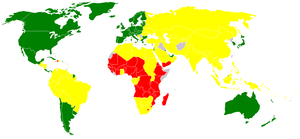some one is grumpy in the morning!
12 hour days (nights) do that sometimes
Given time, I suspect they'll catch up. OTOH, their industry has basically no ecological restrictions or controls at all, do they?
Can you say Kyoto?
some one is grumpy in the morning!
Given time, I suspect they'll catch up. OTOH, their industry has basically no ecological restrictions or controls at all, do they?
Can you say Kyoto?
Correct me if I'm wrong, but don't they have more "persons?" Given time, I suspect they'll catch up. OTOH, their industry has basically no ecological restrictions or controls at all, do they?
Yes, if everybody in China started being as wasteful as the US there'd be a crisis for sure.



Most of China is third world at best. They simply can't be as wasteful as individuals in the US. I'm absolutely certain you find this somehow noble and self-sacrificing or some such, but nothing could be further from the truth.
 .
.
It's also one of the reasons for Kyoto... trying to stop 1st world countries from using 3rd world countries as their garbage dumps by making them accountable.


















Stop it, man, you're killing me.
Either way...they can't just fire and forget when it comes to pollution anymore.
You may be right but the people in the large cities in China are about 1/4th as wasteful as the average US citizen. That's not really explained by your "3rd world" theory.
I don't know that it's at all noble or self-sacrificing. It just happens to be how it is. It might be possible for them to catch up.
The assumptions were funny.

Yes, as a matter of fact it is. Completely and specifically.
 This seems perfectly clear to me. I don't know why Spike thinks living in a large city has any bearing on this whatsoever. I suspect that he simply didn't think it through and was just being argumentative and contradictory, but we won't be surprised when he contradicts that, will we?
This seems perfectly clear to me. I don't know why Spike thinks living in a large city has any bearing on this whatsoever. I suspect that he simply didn't think it through and was just being argumentative and contradictory, but we won't be surprised when he contradicts that, will we? 
Sowwy CharlieWe haven't in over a generation. I assume you guys don't either. Our problems have been adressed.
Many old electronic goods gather dust in storage waiting to be reused, recycled or thrown away. The U.S. Environmental Protection Agency (EPA) estimates that as much as three-quarters of the computers sold in the United States are stockpiled in garages and closets. When thrown away, they end up in landfills or incinerators or, more recently, are exported to Asia.
E-waste is routinely exported by developed countries to developing ones,
often in violation of the international law. Inspections of 18 European
seaports in 2005 found as much as 47 percent of waste destined for
export, including e-waste, was illegal. In
the United States, it is estimated that 50-80 percent of the waste collected for recycling is being exported in this way. This practice is legal because
the United States has not ratified the Basel Convention
China tried to prevent this trade by banning the import of e-waste in
2000. However, we have discovered that the laws are not working; e-waste
is still arriving in Guiya of Guangdong Province, the main center of
e-waste scrapping in China. <br><br>We have also found a growing
e-waste trade problem in India. Twenty-five thousand workers are employed at scrap yards in Delhi alone, where 10,00 - 20,000 tons of e-waste is handled each year, 25 percent of this being computers. Other e-waste scrap yards have been found in Meerut, Ferozabad, Chennai, Bangalore and Mumbai.
In the 1990s, governments in the EU, Japan and some U.S. states set
up e-waste "recycling" systems. But many countries did not have
the capacity to deal with the sheer quantity of e-waste they generated
or with its hazardous nature. <br><br>Therefore,
they began exporting
the problem to developing countries where laws to protect workers and
the environment are inadequate or not enforced. It is also cheaper to
"recycle" waste in developing countries; the cost of glass-to-glass
recycling of computer monitors inthe United States is 10times more than
in China.<br><br>Demand
in Asia for electronic waste began to grow when scrap yards found they
could extract valuable substances such as copper, iron, silicon, nickel
and gold, during the recycling process. A mobile phone, for example, is
19 percent copper and eight percent iron.<br>
Look at England pre / and post Industrial revolution!
Whole new ball game.
Sowwy Charlie
Greenpeace
I'm not saying that Canada is any better... but it's still happening, hear and in Europe
Maybe he thinks third world nations don't have large cities????


Countries that have more advanced economies than developing nations but haven't yet gained the level of those in the First World are grouped under the term Newly Industrialized Countries or NICs. Current examples includes China, India, Mexico or South Africa to name a few.

